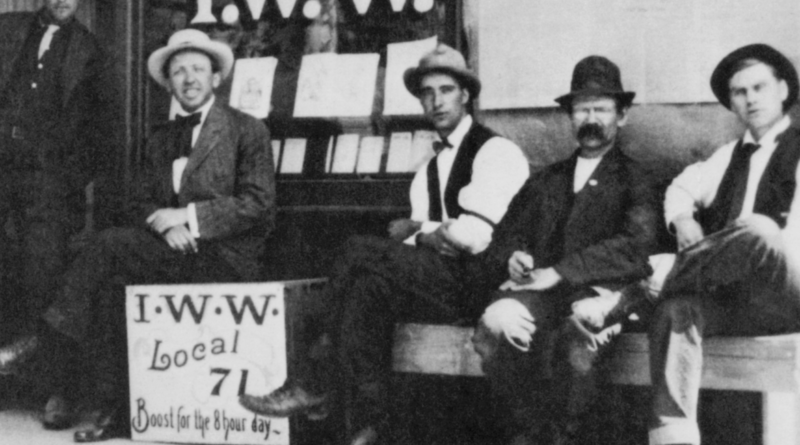INTERVIEW: IWW-centered doc ‘The Wobblies’ still relevant in 2022
Photo: The Wobblies has been restored and is now playing in movie theaters, thanks to Kino Lorber. Photo courtesy of Kino Lorber / Provided by Fusion Entertainment with permission.
Stewart Bird and Deborah Shaffer’s important labor-rights documentary The Wobblies tells the story of the Industrial Workers of the World (IWW), a labor union that championed the rights of unskilled laborers, regardless of their race or gender, according to press notes. The revolutionary story they captured was relevant in the late 1970s when the movie first premiered at the New York Film Festival, and today, the message still proves relevant. That’s one of the reasons The Wobblies, the name given to the IWW, is back from Kino Lorber with a 4K restoration and playing in movie theaters around the country.
“In 2018, we had a screening at UnionDocs in Brooklyn that had been organized by some people from the Film Preservation Fund of New York Women in Film & Television, who had previously restored the film in 2004,” Shaffer said. “They had given us a grant, and we had done a film restoration. So I hadn’t seen the film in many years, and neither had Stew. And we showed up to the screening at UnionDocs, and I remember it was a miserable February night, cold and rainy. I think we were all stunned that night by the relevance of the film in 2018. I think none of us expected that. I would have thought of it as a history film. It’s a film about history, but in fact the themes it was talking about, especially immigrant workers, discrimination, deportation, race discrimination and gender, it was so incredibly relevant that we all looked at each other that night and said this film needs an updated version.”
In the end, Bird and Shaffer didn’t update the film per say. Instead, they restored the original to a glorious digital copy, with much thanks to the Museum of Modern Art. “I would love it if the film was kind of irrelevant,” Shaffer said with a laugh. “That might sound odd, but I think it’s very distressing.”
Even though The Wobblies proves pertinent for today’s workforce, Bird remains hopeful for labor rights in the future, especially with the news coming out of places like Amazon and Starbucks. These small victories for labor unions could have a great impact, and perhaps it’s the beginning of “bringing back unionization,” as Bird put it. In his estimation, the height of union activity in the United States was in the mid-1950s when more than 1/3 of the nation were members of a union. Today, that number is hovering near 10 percent.
“I’m very hopeful,” Bird said. “What the Wobblies represented and people finding out about it, it’s depressing on one hand, but I feel very hopeful about it.”
Shaffer fully admitted to being pessimistic about the state of the world, but the IWW vision of true social justice for everyone, that’s an ideal she hopes continues to be an aspirational goal. In her mind, workers should keep on working toward that concept, even if it’s currently out of reach.
Putting the Pieces Together
“We look back fondly, but it was a tough process,” Bird said about the actual filmmaking that went into The Wobblies. “We felt we were under the deadline of trying to get to these very elderly people before they died. We wanted to get the oral history in the box and in the can, so to speak, so it was chaotic in that way. And we didn’t have money at the beginning. We eventually got an NEH grant [National Endowment for the Humanities], but it all took a while. And we were lucky that we had a lot of terrific people working on the research.”
One collaborator was fellow filmmaker Peter Rafferty, who was working simultaneously on what would become his own celebrated archival film, The Atomic Cafe. Together with Bird and Shaffer, the trio found incredible footage of the IWW in the Library of Congress. These archives were paired with real-life interviews to make for a stirring narrative.
“The movie checked out what they said in terms of accuracy,” Bird said about the fact-checking process. “They were all incredibly accurate to the day, to the hour, names of people, names of institutions, what had happened, but the big drive was to get them all on camera since most of them were in their 80s, late 80s and even early 90s.”
Shaffer added: “Our archival research process was definitely exhaustive. I happened to really love that work. I love poking around in old archives. I remember looking at nitrate film … out in L.A. on a hot summer day in an un-air-conditioned place. I kept thinking, is this really safe? Am I supposed to be doing this? But we really didn’t want to miss anything. … This is before the internet that we’re looking for this material. We wrote actual letters to every state historical society in the United States asking what they had in their collections — certainly everyone that had anything to do tangentially involved with the IWW. And we asked everybody we interviewed what they had in their attics. We looked everywhere we could think of. We wanted to get stuff that hadn’t been used, that hadn’t been seen, and we didn’t want to miss anything. That part was fun. For me, that part was fun.”
By John Soltes / Publisher / John@HollywoodSoapbox.com
The Wobblies, directed by Stewart Bird and Deborah Shaffer, is now playing in theaters in a new 4K restoration from Kino Lorber. Click here for more information.

